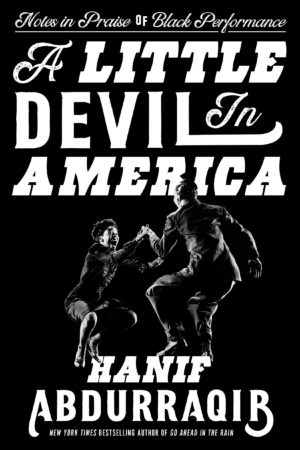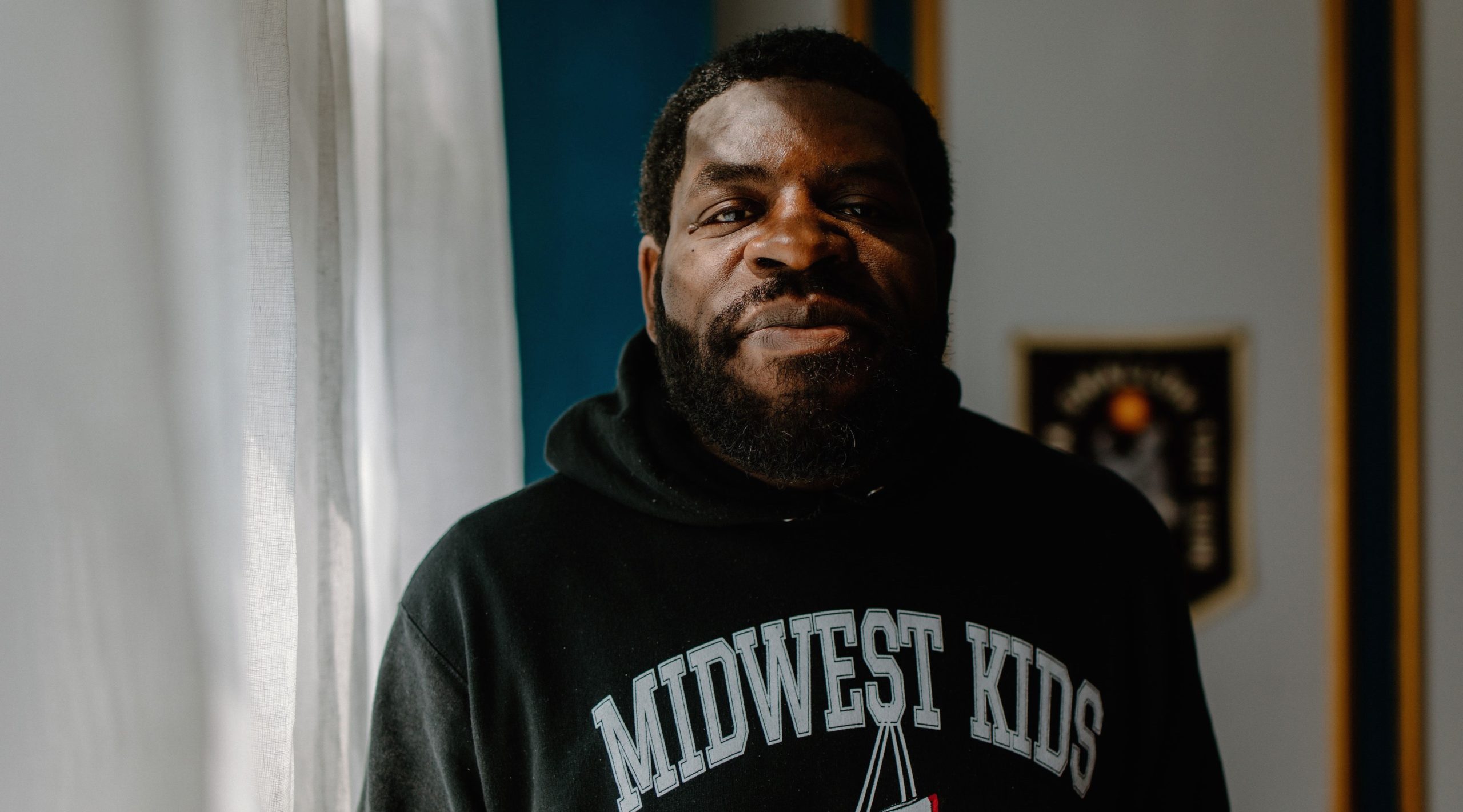Author Hanif Abdurraqib is a scholar of the emotional connections established between music and listeners, explored in his essay collection They Can’t Kill Us ’til They Kill Us, as well as Go Ahead in the Rain, a book about A Tribe Called Quest that’s equal parts critical biography and love letter.
His latest book, A Little Devil in America, traces the history of Black performance in American cultural history, analyzing specific performances with the detail of a historian and the vivid imagery of an accomplished poet. He includes passages on Aretha Franklin, Beyoncé, spades, dancing, and more.
Speaking from his home in Ohio in early March, he repeatedly returns to Don Cornelius’ seminal music and dance program Soul Train, a crucial source for the book. “I felt like the book most came to life when I was immersed in those visuals,“ he says. We spoke about his new book, working through the Soul Train archives, and Rick Ross guest verses.

The foreword mentions that the original idea of the book was a sort of photo negative of what the book became. How did you first conceive of this book?
It was gonna be about appropriation, largely—the white appropriation of Black art, and minstrel shows and minstrelry’s appropriation. It stemmed from this visit I took to Memphis, to the Stax Museum. I was so off-put by seeing Isaac Hayes’ convertible that was taken from him when he ran into financial troubles in the ’70s in a museum. And while he was still alive—he couldn’t access it, but it was in this museum. And Graceland is in Memphis, and everything that Elvis touched is bronzed, all that.
But then I realized halfway through writing the book that it didn’t feel fun, it didn’t feel exciting to me. Because of the angle I had chosen to take, the work was still kind of centering whiteness and white people, not prioritizing what I felt like I wanted to prioritize, which was a celebration of Black performers and Black performance, and an unspooling of the many ways that I believe performance works. I was seeking something different, something a bit more pleasurable in the process.
Did your attitude toward the project change with that new focus? Was it a more enjoyable project from there?
What’s wild is this is the most fun I’ve had writing a book. I’m at a point now where I find myself a little bit heartbroken by the fact that it’s preparing to enter the world. I’ve never felt this good writing a book before, and I realized there’s no guarantee that I will ever feel this good writing a book again. Obviously, I’m not sitting at home like, “Oh, boohoo, poor me, I have a book coming out.” But I’m mourning having this book be no longer just mine, when for a long time it was just mine.
“I’ve never felt this good writing a book before, and I realized there’s no guarantee that I will ever feel this good writing a book again. I’m mourning having this book be no longer just mine, when for a long time it was just mine.”
Do you see your own live readings as performances in the way you cover in the book?
I think that because so much of my work involves me being present in front of other people and articulating enthusiasm, it feels to me often that these things are performed in a way. A big part of this work, for me, was detaching myself from the shame I felt around the word “performative.” Because I don’t think that necessarily needs to have a negative connotation at all. And I think that, with any luck, thoughtfully performing one’s enthusiasm or eagerness to be present in the world is a worthwhile, celebratory thing. So I wanted that to come out in the book as well.
Did you have any specific music that you were listening to while working on this, besides the performances themselves?
This was a really visual experience for me, so I actually didn’t listen to a lot. The story that’s now becoming the legend of this book is that I got a hard drive with, like, every Soul Train episode from the ’70s and ’80s on it, and just watched hours and hours of Soul Train, not even seeking anything, just enjoying the process of watching and allowing myself to sink into that process of watching. To kind of bring myself closer to what felt like a kinship with the performers and dancers and the atmosphere of Soul Train as Don Cornelius presented it. So many of these performances feel like miracles to me, you know, and it’s a real gift to witness something you believe is a miracle and bring yourself back to an understanding that it was real.
That sounds like some Questlove level safekeeping.
Questlove had a hard drive. I heard he lost it. I mean, yeah, I will be clear, my hard drive is not the one Questlove lost. And I hope he found it. But if he didn’t, I got one for him. I’ll send the one I got to him.
There’s a motif of omission in the book, from opting not to discuss Whitney Houston’s drug use to Merry Clayton’s disinterest in speaking on her miscarriage. How do these deliberate omissions tie into the themes of the book?
I think so much of the decisions I was interested in pursuing were asking myself the questions of, What most does the work to uplift what I love about a person’s legacy, complicated as that legacy might be? What centers pleasure, or the enthusiasm that I feel for the things that brought me for the page? How can I always focus back on what brought me to the page as a tool of writing about the life of a person, no matter how complicated that life is?
How did you bring your own experiences and personal connections to these performances into the book?
You know, what’s interesting is I actually think this is maybe the least personal book that I’ve written. Of course, I’m present in it, but so much of my presence in it is to reassure people that I’m still with them. As we weave in and out of this multitudinous multiverse of Black performance, I had to have moments that regrounded people in an understanding of my presence, that I’m not leaving them alone to wade through these complex threads, and that I’m articulating something I feel that I’m connected to and not detached from, like my history is not detached from this history. And that felt important.
“A big part of this work, for me, was detaching myself from the shame I felt around the word ‘performative.’ Because I don’t think that necessarily needs to have a negative connotation at all. And I think that, with any luck, thoughtfully performing one’s enthusiasm or eagerness to be present in the world is a worthwhile, celebratory thing.”
The passage on Dipset’s inversion of American symbolism was really fascinating. Do you see that in dialogue with something like the There’s a Riot Goin’ On album cover or the Stankonia album cover?
To me, reworking the American flag feels similar to the reworking of the Make America Great Again hats. I’m just not interested in that particular type of manipulation around that particular type of image. But I think it does have a very strong history among Black Americans that I am fascinated by, particularly There’s a Riot Goin’ On. I’m so fascinated by that cover, and that album. That is my favorite Sly Stone album. There’s a Riot Goin’ On has some complications that I love diving into.
I love that they titled it in response to Marvin Gaye.
Especially because it reminds me that so much of these processes of lineage are not something whimsical, right? Black artists have been responding to other Black artists for years. And this isn’t something fantasy-driven—this is a very real thing. And there’s real, tangible impacts of honoring the lineage of a Black artist you admire who did something before you did something. There’s a real gift in acknowledging that you yourself are not the first to achieve something. I really try to, in everything I work on, remember that I’m sitting in a lineage of other people who have done this work already, in some capacity, and I owe it to myself to return to them, even if it’s just like picking up an allegory or something like that.
“I really try to, in everything I work on, remember that I’m sitting in a lineage of other people who have done this work already, in some capacity, and I owe it to myself to return to them, even if it’s just like picking up an allegory or something like that.”
Was that the idea behind the passages on the competition between Joe Tex and James Brown?
Part of it, yeah. But also, if I’m really fascinated by history, that’s when I know I’ve got to spend more time with it. I was just so fascinated by that story about James Brown shooting up the club. And I didn’t know that Otis Redding was there. When I found that out, I was like, I got to know everything about James Brown and Joe Tex from the beginning. Growing up in Black households you hear parts of it, but I needed the real core of it.
In the passages about Al Jolson, you spell out this idea of love and consumption being separate things. Is that something that you’ve run into as an author and a public figure, that people cross some sort of boundaries in their consumption of your work?
Oh, sure. It’s just a part of it, you know? I’m someone who makes it pretty clear that I believe consumption and affection are two different machines entirely. Something I’ve learned through years of loving artists, or being a fan, is that my love for someone’s work doesn’t gain me any real understanding of, like, affection, for example. But through that love, I can better understand and contextualize myself, if I’m lucky. And while that might grow my affection for a person’s work, it still behooves me—and behooves all of us—to understand that a person’s work and a person’s life and a person’s humanity are, as much as they’re intertwined, not the same, and they’re not always up for grabs.
What new music are you excited about?
I love Sydney Sprague‘s album maybe i will see you at the end of the world. I really love the Adrian Younge album. I don’t like all the Drake songs that he put out, but I love “Lemon Pepper Freestyle.” It’s really good return to some pretty good forms for him.
I like that he’s seemingly dedicated to checking in with Rick Ross every couple of years.
Rick Ross doesn’t really contribute a ton to “Lemon Pepper Freestyle,” but he kind of offers a good runway. Much like he did on “Lord Knows,” you know? So I like that that’s their dynamic in some ways. Rick Ross’ verse is, like, a minute, if that? And the Drake verse is, like, six minutes? But it’s always good to hear from Ross from time to time. FL









